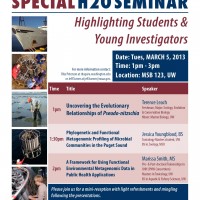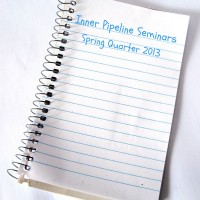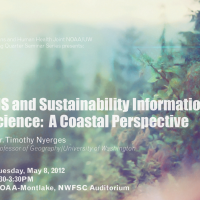This quarter we have another exciting line-up of speakers, both students and faculty (see schedule below). So far we’ve already been treated to one excellent, philosophical talk by PoE Faculty Megan Styles on the use of historical family artifacts as an entry point into understanding environmental history.
This week we move onwards and downwards (into the mud of local estuaries, that is) with a presentation by PoE Capstone Advisor, Sean McDonald, about his own research on the “Conflict between scientists and social scientists in WA geoduck aquaculture.” Don’t miss what will surely be a fascinating talk on the legendary geoduck clam!
PoE Lunch meets every Thursday from 12:00-1:00 in PoE Commons, Wallace Hall. Everyone is welcome to join us. Bring your lunch. Bring a friend. Get academic credit if you want it. Treats provided by PoE. Our website is here: http://poelunch.tumblr.com/
Spring Quarter 2013 Speaker Schedule:
April 4, Megan Styles (PoE faculty), “Understanding environmental history through my family’s history and photos.”
April 11, Sean McDonald (PoE faculty), “Conflict between scientists and social scientists in WA geoduck aquaculture.”
April 18, Kiki Jenkins (SAFS faculty), “The intersection of art and environmental science.”
April 25, LuAnne Thompson (Program on Climate Change), “Global Health, Climate Change, and Kenya.”
May 2, Celese Spencer/Suzy Karl (UW Biology), “Environmental interpretation and why it’s important.”
May 9, Jane Dolliver (COASST), “What is COASST and what are some cool opportunities for you in COASST?”
May 16, Beth Wheat (PoE faculty), “My studies of fresh water shrimp in Costa Rica.”
May 23, Sophie Hart, “My experience with ‘social farming’ in correctional institutes, and why it’s important.”
May 30, Sarah Sanborn (PoE student), tbd
June 6, An Huynh (ESRM student), “My homestay with a Quechua family in the high Andes of Peru.”
If you would like to speak this quarter or in a future quarter, please email to timbillo@uw.edu. We’re especially hoping to get some undergraduates too—talk about a cool study abroad experience, or an internship, or any topic you’ve been thinking about. You can either show us some slides, or lead a discussion by posing thought-provoking questions, or both! You will get 45-50 minutes on the “stage” but you don’t need to take all of it!
Credit available: If you like, register for 1 credit towards your Perspectives and Experiences requirement. SLN #20973 Course Name: ENVIR 495








 Interested in K-12 environmental education?Want to gain first hand experience volunteering in an environmental ed organization or classroom while receiving academic credit?Then, this UW Inner Pipeline seminar might be of interest to you:
Interested in K-12 environmental education?Want to gain first hand experience volunteering in an environmental ed organization or classroom while receiving academic credit?Then, this UW Inner Pipeline seminar might be of interest to you: